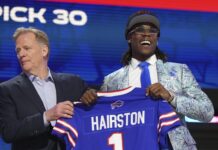
The NCAA and it’s five power conferences — ACC, SEC, Big Ten, Big 12 and Pac 12 — have agreed on a multibillion-dollar settlement that resolves three federal antitrust cases and allows schools to directly pay student-athletes, according to ESPN’s Dan Murphy and Pete Thamel.
The NCAA and the Power 5 conferences released this joint statement:
The NCAA will pay $2.7 billion over 10 years in damages to both current and former athletes, according to ESPN’s report.
Athletes that go back to 2016 are eligible for a piece of the settlement, the terms of the agreement dictate that athletes cannot sue the NCAA in future antitrust lawsuits and must drop their current complaints in a trio of ongoing lawsuits, House vs. NCAA, Hubbard v. NCAA and Carter v. NCAA.
Schools will reportedly enter into a revenue-sharing partnership that allows them to give up to $20 million per year to their student-athletes. The revenue sharing isn’t expected to begin until fall 2025.
The settlement doesn’t mean that student-athletes will be directly considered school employees, as those talks remain ongoing. And another high-profile lawsuit against the NCAA—former Colorado football player Alex Fontenot’s lawsuit regarding how the NCAA shares its television revenues with the players—remains ongoing and won’t be included in this potential settlement.
The current settlement still needs the approval of Judge Claudia Wilken and is contingent on past and former college athletes choosing not to join a separate antitrust case. If a number of players choose to join Fontenot’s lawsuit instead, the settlement agreed upon by the NCAA and conferences could fall apart.
Still, Thursday’s news has the potential to be the latest milestone in the ever-evolving landscape of college sports.
“We recognize that we’re just on the front end of this entire process,” Josh Whitman, Illinois athletic director and chair of the NCAA’s Division I Council, told ESPN. “There’s a lot to be sorted out as we try to really wrap our arms around some of the details that we’re putting in place now.”









